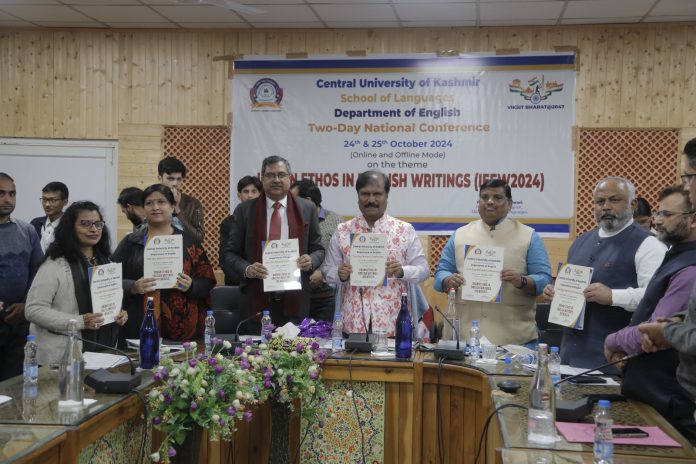GANDERBAL: Central University of Kashmir (CUKashmir) Vice-Chancellor, Prof. A Ravinder Nath Thursday inaugurated the two-day National Conference on “Indian Ethos in English Writings (IEEW2024),” organised by the Department of English, School of Languages, in a hybrid mode (online and offline).
Prof. S.P. Bansal, Vice-Chancellor, Central University of Himachal Pradesh (CUHP) was the Chief Guest and Guntha Laxmanji, a distinguished figure from IKS and ABRSM, was the Guest of Honour. Prof. Sandhya Tiwari, Chairperson of the Conference and Dean, School of Languages, Prof. Syed Zahoor Ahmad Geelani, Dean School of Education, faculty members, research scholars and students were present on the occasion.
Addressing the participants, Vice-Chancellor, Prof. A Ravinder Nath, said, “the presence of Indian ethos in English writings is not only a testament to the adaptability of India’s culture, but also a symbol of how profoundly Indian thought and sensibilities have influenced global narratives.” Emphasising the importance and necessity of English writings in conveying the Indian ethos to the global audience, Prof. A Ravinder Nath, said, “Indian ethos embodies the core principles, traditions, and philosophies that have been passed down through generations, which include values like familial bonds, spiritual consciousness, the pursuit of knowledge, and respect for diversity in religion and language.”
Prof. A Ravinder Nath further revealed that the university is signing a Memorandum of Understanding with the CUHP for holding joint academic activities including seminars, conferences and workshops and sharing teaching-learning resources.
In his address, CUHP, Vice-Chancellor, Prof. S.P. Bansal, lauded the School of Languages for organising the conference and said, the event provides a platform to engage and reflect on how Indian ethos shapes not only the literature, but also our understanding of ourselves. “Today, Indian English literature stands at the intersection of postcolonial discourse and global literature. Our writers have used the English language to reflect on the legacies of colonialism, explore the struggles of independence, and engage with the rapid modernization and globalization that India continues to experience.” He added: “Writers like R.K. Narayan, Kamala Das, and Mulk Raj Anand led the way in portraying Indian life—its rhythms, its struggles, and its beauty—through stories that are quintessentially Indian, even though they were penned in English.” CUHP Vice Chancellor also expressed his desire in collaborating with the CUKashmir in research, and journal publications.
Speaking on the occasion, Guntha Laxmanji, praised the organisers for the conference stating that it guides the students and scholars to carry out their research properly and make it productive. He highlighted the essence of “Vasudhaiva Kutumbakam, The World is One Family.” Highlighting the Importance of English writings to carry the Indian ethos to the English-knowing world, he said, “When we speak of Indian ethos, we refer to the philosophical, cultural, and moral values that define us as a civilization. These values, deeply rooted in our ancient traditions, continue to shape our society today.”
Earlier, in her welcome address, Professor Sandhya Tiwari, thanked the scholars, faculty, and administration, with special appreciation to the Vice-Chancellor’s unwavering support and encouragement in facilitating the conference. Prof. Sandhya introduced the conference theme, underscoring the profound significance of Indian ethos, not only within Indian literature in English but also in its broader impact on world literature. She said that over the course of two days, the conference will feature paper presentations, and interactive sessions covering several related topics. “The event provides a platform for both emerging and established scholars to exchange ideas and contribute to the academic discourse on Indian literary traditions in English.” She commended the university’s dedication to the implementation of NEP 2020.
In the technical sessions held in the online mode, two plenary talks were held and six technical sessions conducted in which 50 papers were presented from across the country.
Sunil Kumar, Asst Prof started the inaugural session. Aimen, research scholar conducted the programme proceedings and Calvin, research scholar, proposed the vote of thanks. Junaid ul Islam was the rapporteur.


